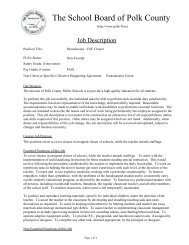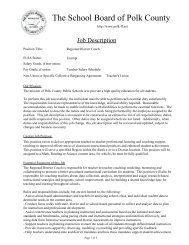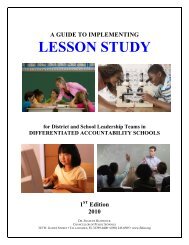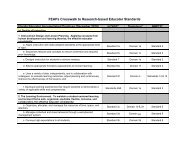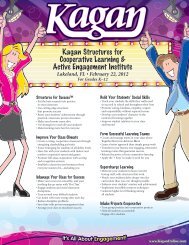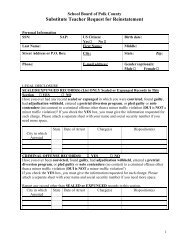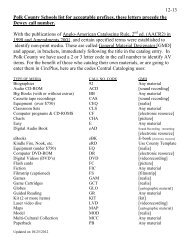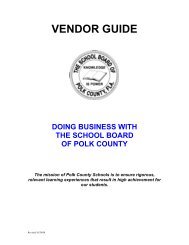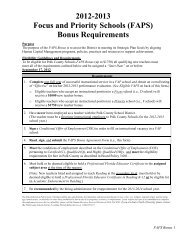Families Building Better Readers - Polk County School District
Families Building Better Readers - Polk County School District
Families Building Better Readers - Polk County School District
Create successful ePaper yourself
Turn your PDF publications into a flip-book with our unique Google optimized e-Paper software.
Guiding Reading Practice<br />
Goal:<br />
Activity:<br />
Supplies:<br />
Help your child get the most out of reading practice.<br />
Parents can help their children improve reading scores by offering consistent opportunities for good<br />
reading practice at home. This blueprint gives you some ideas for helping your child get the most out of<br />
the time he or she spends practicing reading.<br />
In this activity you will use proven strategies to “keep the ball rolling” by effectively guiding your<br />
child’s reading practice.<br />
Locate books, magazines, textbooks, newspapers, etc., that are on the appropriate practice level<br />
for your child (see “Choosing the Right Book” blueprint)<br />
What to Do...<br />
1. Make sure your child benefits from doing easy repeated readings.<br />
This approach is just what it sounds like; the child reads the same easy book over and over again. Easy repeated<br />
readings help children speed up their reading rates, learn new sight words, and develop their abilities to read<br />
in a natural voice using more expression.<br />
2. Make reading practice an enjoyable thinking activity.<br />
Interact with the story as your child reads. Ask questions and react to story events. Summarize events<br />
periodically and seek predictions for what may happen next.<br />
3. Help your child with difficult words.<br />
If your child is stuck on a word for more than three seconds, pronounce the word so your child can maintain<br />
the flow in reading. Letting your child struggle for a long time on a particular word interferes with his or<br />
her ability to understand the text. After you finish reading the book, you can look back at the words your child<br />
missed and review them or practice those words later using flashcards (see “Three Strikes—You Win” blueprint).<br />
4. Try taking turns.<br />
Your child does not have to do all the reading. It is okay to take<br />
turns reading, especially if the story is long. Try these strategies:<br />
• Echo reading<br />
You read a selection using proper expression<br />
and your child mimics you by reading it again.<br />
• Tap-off reading<br />
Each of you indicates when you want your<br />
turn to end by tapping the table or each other.<br />
4<br />
F A M I L I E S B U I L D I N G B E T T E R R E A D E R S TM



